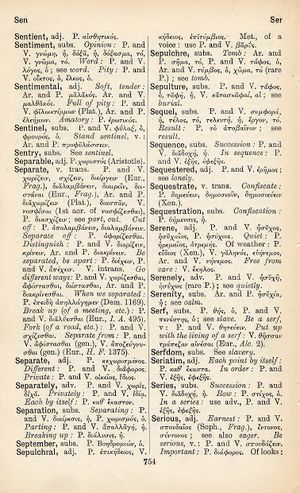separate
προγράψαντες οὖν τά τε θεωρήματα καὶ τὰ ἐπιτάγματα τὰ χρεῖαν ἔχοντα εἰς τὰς ἀποδείξιας αὐτῶν μετὰ ταῦτα γραψοῦμές τοι τὰ προκείμενα → having therefore written at the beginning the theorems and the postulates that are necessary for their proofs, we will then write out for you the propositions
English > Greek (Woodhouse)
v. trans.
P. and V. χωρίζειν, σχίζειν, διείργειν (Eur., Frag.), διαλαμβάνειν, διαιρεῖν, δαστάναι (Eur., Frag.), Ar. and P. διαχωρίζειν (Plat.), διασπᾶν, V. νοσφίσαι (1st aor. of νοσφίζεσθαι), P. διασχίζειν; see part, cut.
Cut off: P. ἀπολαμβάνειν,διαλαμβάνειν.
Separate off: P. ἀφορίζεσθαι.
Distinguish: P. and V. διορίζειν, κρίνειν, Ar. and P. διακρίνειν.
Be separated, be apart: P. διέχειν, P. and V. ἀπέχειν.
V. intrans. Go different ways: P. and V. χωρίζεσθαι, ἀφίστασθαι, διίστασθαι, Ar. and P. διακρίνεσθαι.
When we separated: P. ἐπειδὴ ἀπηλλάγημεν (Dem. 1169).
Break up (of a meeting, etc.): P. and V. διαλύεσθαι (Eur., I.A. 495).
Fork (of a road, etc.): P. and V. σχίζεσθαι.
Separate from: P. and V. ἀφίστασθαι (gen.), V. ἀποζεύγνυσθαι (gen.) (Eur., H.F. 1375).
adj.
P. κεχωρισμένος.
Different: P. and V. διάφορος.
Private: P. and V. οἰκεῖος, ἴδιος.
Latin > English (Lewis & Short)
sēpărātē: adv., v. separo,
I P a. fin.
Latin > French (Gaffiot 2016)
sēpărātē, seult au comp. separatius : Cic. Inv. 2, 156, à part, plus spécialement.

